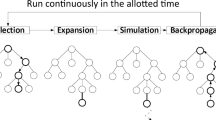Abstract
A modern computer-based simulation tool (WaterMan) in the form of a game for on-farm water management was developed for application in training events for farmers, students, and irrigators. The WaterMan game utilizes an interactive framework, thereby allowing the user to develop scenarios and test alternatives in a convenient, risk-free environment. It includes a comprehensive soil water and salt balance calculation algorithm. It also employs heuristic capabilities for modeling all of the important aspects of on-farm water management, and to provide quantitative performance evaluations and practical water management advice to the trainees. Random events (both favorable and unfavorable) and different strategic decisions are included in the game for more realism and to provide an appropriate level of challenge according to player performance. Thus, the ability to anticipate the player skill level, and to reply with random events appropriate to the anticipated level, is provided by the heuristic capabilities used in the software. These heuristic features were developed based on a combination of two artificial intelligence approaches: (1) a pattern recognition approach and (2) reinforcement learning based on a Markov decision processes approach, specifically the Q-learning method. These two approaches were combined in a new way to account for the difference in the effect of actions taken by the player and action taken by the system in the game world. The reward function for the Q-learning method was modified to reflect the suggested classification of the WaterMan game as what is referred to as a partially competitive and partially cooperative game.













Similar content being viewed by others
References
Adam J, Lettenmaier D (2003) Adjustment of global gridded precipitation for systematic bias. J Geophys Res 108:1–14
Allen R, Pereira L, Raes D, Smith M (1998) Crop evapotranspiration—guidelines for computing crop water requirements. In: Irrigation and Drainage Paper 56. Food and agriculture Organization of the United Nation, Rome, p 300
Ayers R, Westcot D (1985) Water quality for agriculture. In: Irrigation and Drainage Paper 29, Rev. 1. Food and agriculture Organization of the United Nation, Rome, p 203
Clarke D (2004) Simulation and role playing for irrigation water management. In: Tools for public participation, conflict resolution and decision-making in water resources management, seminar held on 14 October. ICID British Section, London
Doorenbos J, Kassam A (1979) Yield response to water. In: Irrigation and Drainage Paper 33. Food and agriculture Organization of the United Nation, Rome, p 193
Kaukoranta T, Smed J, Hakonen, H (2003) Role of pattern recognition in computer games. In: Proceedings of the 2nd IEEE international conference on cognitive informatics (ICCI’03). IEEE CS Press, London, UK, August
Kos Z, Prenosilova E (1999) Simulation and gaming in water management in Czech Republic. Simul Gaming 30(41):476–481
Lankford B, Sokile C, Yawson D (2004) The river basin game: a role-playing board game for initiating discussions on visions and strategies of water allocation. In: Tools for public participation, conflict resolution and decision-making in water resources management, Seminar held on 14 October. ICID British Section, London
Littman M (1994) Markov games as a framework for multi-agent reinforcement learning. In: Proceedings of the eleventh international conference on machine learning, pp 157–163
Maurer E, Adam J, Wood A (2009) Climate model based consensus on the hydrologic impacts of climate change to the Rio Lempa basin of Central America. Hydrol Earth Syst Sci 13:183–194 (connect to online version)
Prajamwong S, Merkley GP, Allen RG (1997) Decision support model for irrigation water management. J Irrig Drain Eng ASCE 123(2):106–113
Russell S, Norvig P (2003) Artificial intelligence, a modern approach, 2nd edn. Prentice Hall, Upper Saddle River
Sigaud O, Buffet O (2010) Markov decision processes in artificial intelligence, MDPs, beyond MDPs and application. Wiley, Hoboken
Smith L (1989) The Wye college irrigation game, ‘Stop the breach’. Irrig Drain Syst 3:255–264
Stewart JI et al (1977) Optimizing crop production through control of water and salinity levels in the soil, PRWG 151-1. Utah Water Lab, Logan, p 191
Sutton R, Barto A (1998) Reinforcement learning: an introduction. MIT Press, Cambridge
Author information
Authors and Affiliations
Corresponding author
Additional information
Communicated by E. Fereres.
Rights and permissions
About this article
Cite this article
Shaban, M.Z., Merkley, G.P. “WaterMan”: an on-farm water management game with heuristic capabilities. Irrig Sci 34, 483–499 (2016). https://doi.org/10.1007/s00271-016-0516-6
Received:
Accepted:
Published:
Issue Date:
DOI: https://doi.org/10.1007/s00271-016-0516-6




